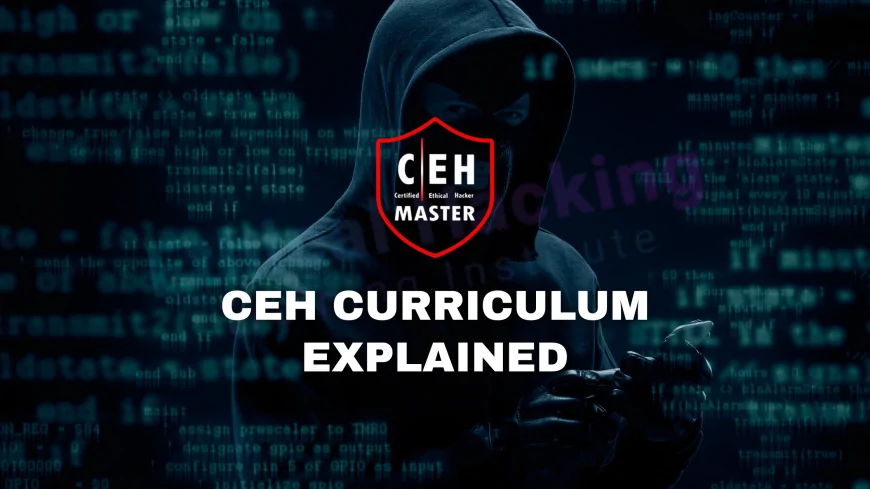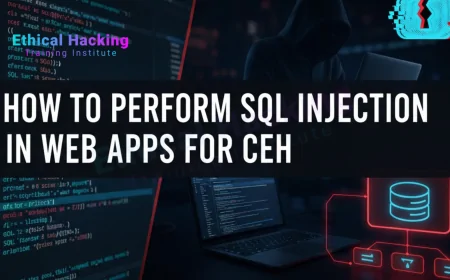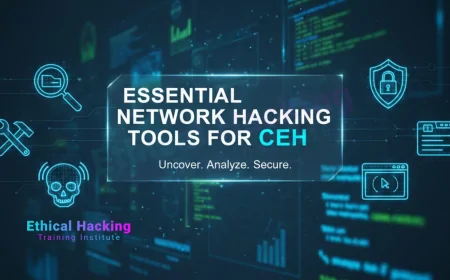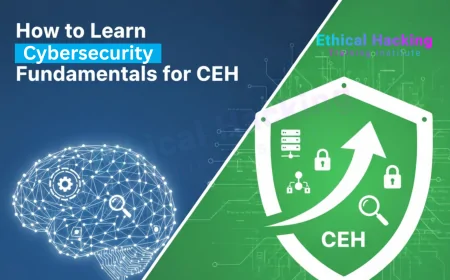The Certified Ethical Hacker Course: A Deep Dive into What You’ll Learn | Everything You’ll Learn in the Certified Ethical Hacker (CEH) Program
Master ethical hacking with CEH certification. Learn tools, techniques, and skills to defend systems, pass the exam, and boost your cybersecurity career.

Table of Contents
- Introduction
- What is the Certified Ethical Hacker (CEH) Course?
- Why Choose CEH Certification?
- In-Depth Modules Covered in the CEH Curriculum
- 1. Introduction to Ethical Hacking
- 2. Footprinting and Reconnaissance
- 3. Scanning Networks
- 4. Enumeration
- 5. Vulnerability Analysis
- 6. System Hacking
- 7. Malware Threats
- 8. Sniffing
- 9. Social Engineering
- 10. Denial-of-Service Attacks
- 11. Session Hijacking
- 12. Hacking Web Servers
- 13. Hacking Web Applications
- 14. SQL Injection
- 15. Hacking Wireless Networks
- 16. Hacking Mobile Platforms
- 17. IoT and OT Hacking
- 18. Cloud Computing Threats
- 19. Cryptography
- Real-World Applications of CEH Skills
- Career Benefits and Job Roles After CEH
- Who Should Take the CEH Course?
- CEH Exam Format and Certification Requirements
- Recommended Study Resources and Tools
- FAQs
- Conclusion
Introduction
In the world of cybersecurity, ethical hackers are the frontline defenders. As cybercrime continues to evolve, the need for professionals who can think like a hacker—but act legally and ethically—has become critical. The Certified Ethical Hacker (CEH) course equips learners with the skills to identify vulnerabilities and safeguard digital environments. This guide will take you through a deep, module-by-module overview of the CEH certification and its career-altering benefits.
What is the Certified Ethical Hacker (CEH) Course?
The CEH certification, developed by the EC-Council, is one of the most recognized ethical hacking certifications in the world. It covers tools and techniques used by malicious hackers and helps cybersecurity professionals understand and counteract them.
CEH teaches how to:
-
Penetrate systems lawfully
-
Assess vulnerabilities
-
Analyze threats
-
Develop security strategies
Why Choose CEH Certification?
-
Globally recognized by government & private organizations
-
Qualifies you for high-paying cybersecurity roles
-
Hands-on lab experience with real tools
-
Mapped to NICE 2.0 framework and DoD 8570 compliant
This course is ideal for cybersecurity analysts, penetration testers, and system administrators who want to specialize in offensive security.
In-Depth Modules Covered in the CEH Curriculum
1. Introduction to Ethical Hacking
-
Understanding threats, attack vectors, and hacker types
-
Legal and regulatory compliance
2. Footprinting and Reconnaissance
-
Passive and active information gathering
-
Google hacking, WHOIS lookups, DNS enumeration
3. Scanning Networks
-
Port scanning, vulnerability scanning, network mapping
-
Tools: Nmap, Angry IP Scanner
4. Enumeration
-
Extracting usernames, network resources, and shares
-
SNMP, LDAP, NetBIOS, NFS enumeration
5. Vulnerability Analysis
-
Identifying security weaknesses using Nessus, OpenVAS
-
CVE analysis and risk scoring
6. System Hacking
-
Gaining access, privilege escalation, covering tracks
-
Keyloggers, password cracking, steganography
7. Malware Threats
-
Viruses, worms, Trojans, ransomware analysis
-
Detection and containment strategies
8. Sniffing
-
Packet capturing, MITM attacks
-
Tools: Wireshark, Cain & Abel
9. Social Engineering
-
Human-based hacking tactics like phishing, baiting
-
Email spoofing, pretexting, impersonation
10. Denial-of-Service Attacks
-
Flooding, botnets, amplification
-
Defending networks from DoS/DDoS attacks
11. Session Hijacking
-
TCP/IP hijacking, cookie stealing
-
Countermeasures for secure session handling
12. Hacking Web Servers
-
Web server misconfigurations and patching flaws
-
Exploiting IIS and Apache vulnerabilities
13. Hacking Web Applications
-
Cross-Site Scripting (XSS), CSRF, directory traversal
-
Real-world OWASP Top 10 exploitation
14. SQL Injection
-
Exploiting database flaws
-
Extracting, modifying, and deleting data
15. Hacking Wireless Networks
-
WPA/WPA2 cracking, evil twin attacks
-
Wi-Fi security standards
16. Hacking Mobile Platforms
-
Android/iOS threats and mitigation
-
Rooting, jailbreaking, mobile malware
17. IoT and OT Hacking
-
Exploiting smart devices, sensors, and ICS/SCADA
-
Real-world examples of IoT breaches
18. Cloud Computing Threats
-
Public, private, and hybrid cloud risks
-
Cloud attack vectors and shared responsibility
19. Cryptography
-
Symmetric vs asymmetric encryption
-
Cryptographic attacks and secure implementation
Real-World Applications of CEH Skills
-
Penetration Testing for corporate networks
-
Bug bounty hunting on platforms like HackerOne and Bugcrowd
-
Threat modeling for cybersecurity planning
-
Red teaming exercises in enterprise environments
Career Benefits and Job Roles After CEH
Earning CEH opens doors to titles like:
-
Ethical Hacker
-
Security Analyst
-
Penetration Tester
-
Information Security Auditor
-
Cybersecurity Consultant
Average salary of CEH-certified professionals in India: ₹6–20 LPA
Global average: $70,000 to $120,000 annually
Who Should Take the CEH Course?
-
IT Professionals aiming for cybersecurity roles
-
Security Officers, Auditors, and Analysts
-
Network and Systems Administrators
-
Aspiring ethical hackers or freelance bug bounty hunters
CEH Exam Format and Certification Requirements
-
Exam Code: 312-50
-
Duration: 4 hours
-
Questions: 125 multiple choice
-
Passing Score: ~70% (may vary)
-
Cost: Approx. $950 (varies by country)
Optional: CEH Practical (hands-on lab test)
Recommended Study Resources and Tools
-
Official EC-Council CEH courseware
-
CEH v12 Training (online or instructor-led)
-
Practice platforms: TryHackMe, Hack The Box
-
Tools: Burp Suite, Metasploit, John the Ripper, Nikto
Frequently Asked Questions (FAQs)
1. What is CEH certification?
CEH is a globally recognized ethical hacking certification by EC-Council that trains professionals to identify and fix security vulnerabilities.
2. Who should take the CEH course?
IT professionals, network admins, cybersecurity aspirants, and anyone interested in penetration testing.
3. Is prior experience needed for CEH?
Basic knowledge of networking and security is recommended, though beginners can start with EC-Council’s Essentials Series.
4. How long is the CEH course?
Typically 40–60 hours of instruction, either self-paced or instructor-led.
5. What is the CEH exam fee?
Approx. $950, depending on location and test center.
6. What are CEH job roles?
Ethical Hacker, Penetration Tester, Security Analyst, Information Security Auditor, Cybersecurity Engineer.
7. Is CEH certification worth it?
Yes, it’s valuable for those entering or advancing in cybersecurity careers.
8. What tools are covered in CEH?
Wireshark, Nmap, Metasploit, Burp Suite, Aircrack-ng, and many others.
9. Is CEH valid internationally?
Yes, it’s accepted globally in both private and government sectors.
10. Can I do CEH online?
Yes, online training and exam options are available through EC-Council’s iClass or other authorized training partners.
11. Is there a practical component?
Yes, CEH Practical is an optional hands-on exam that validates real-world skills.
12. How long is the certification valid?
Three years, renewable through EC-Council's ECE program.
13. What’s the passing score for CEH?
Roughly 70%, but may vary slightly based on the question bank.
14. Is CEH better than CompTIA Security+?
They serve different purposes—Security+ is foundational, CEH is offensive/security testing focused.
15. Can CEH help in freelancing?
Yes, especially in bug bounty platforms and freelance security assessments.
16. Are there labs in CEH?
Yes, the course includes hands-on labs and simulation environments.
17. What version is current?
CEH v12 is the latest, featuring learning modules and practical assessments.
18. Can students take CEH?
Yes, students in computer science or cybersecurity can start with CEH if they meet prerequisites.
19. Does CEH require coding?
Basic scripting (e.g., Python, Bash) is helpful but not mandatory.
20. How do I renew my CEH certification?
Earn Continuing Education Credits (ECE) and submit them to EC-Council every 3 years.
Conclusion
The Certified Ethical Hacker (CEH) certification offers more than theoretical knowledge—it delivers job-ready, real-world cybersecurity skills. Whether you're aiming for a career shift, job upgrade, or specialized security role, this course sets you on the right path. Ethical hacking is not just a profession—it's a mission to protect and secure. With CEH, you become a part of that mission.
What's Your Reaction?
 Like
0
Like
0
 Dislike
0
Dislike
0
 Love
0
Love
0
 Funny
0
Funny
0
 Angry
0
Angry
0
 Sad
0
Sad
0
 Wow
0
Wow
0


















